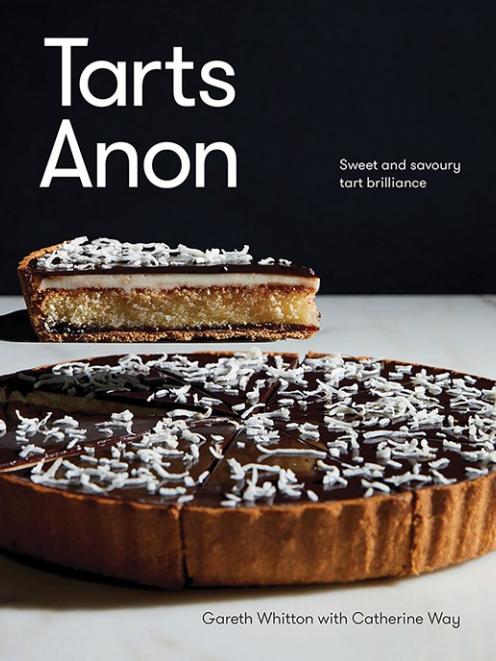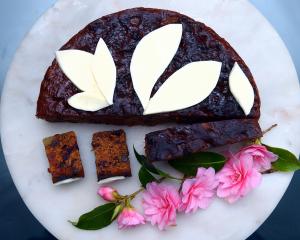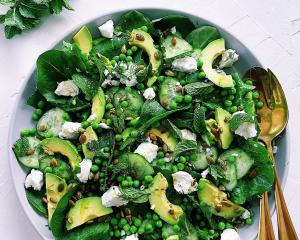
There is nothing like a show-stopping Christmas dessert to finish off a celebration dinner. Here are some of Fresh’s favourites.

Olivia Moore’s maple pecan pie
with cherries and rye
Growing up, Christmas was the one time of year my sister and I were allowed to use fancy ingredients such as walnuts or feta. One year, Mum splurged on pecans for pecan pie (though she swapped half the pecans for almonds to make it cheaper).
This recipe pays homage to her beloved pecan pie, and to the bowl of cherries that only ever appeared at Christmas time.
Serves 6-8
½ batch sweet rye shortcrust pastry (see below)
Filling
3 large eggs
300ml maple syrup
100g brown sugar
50g butter, melted
½ tsp vanilla extract
¼ tsp salt
175g pecans, very roughly chopped, plus extra whole nuts to serve
2 Tbsp plain white flour
To serve
200ml cream, whipped
250g fresh cherries
Method
Preheat the oven to 140°C fan bake. Lightly grease a 20cm loose-bottom tart tin.
On a lightly floured surface, roll out your pastry dough large enough to fit the tin and go up the sides. Transfer the dough to the prepared tin (don’t worry if it breaks — simply mould back together) and gently press into the edges and sides. Refrigerate while you make the filling.
Whisk the eggs in a large bowl to lightly beat. Add the maple syrup, brown sugar, butter, vanilla extract and salt, and whisk to combine. Add the pecans, and evenly sift over the flour. Fold through to mix.
Pour into your chilled dough shell. Bake for 1 hour and 15-20 minutes, until the surface is nicely browned, the pastry is cooked and the filling has only a slight jiggle when shaken.
Remove from the oven and allow to cool completely about 3-4 hours, or overnight in the fridge.
When ready to serve, gently remove from the tin. Place on a serving platter and top generously with whipped cream. Arrange over the cherries. Crush a few extra pecans and sprinkle over top. Slice and serve chilled or at room temperature. If you would like to serve warm, heat before adding the cream and cherries.
Sweet rye shortcrust pastry
Makes 550 to 600g pastry dough
150g plain white flour
125g rye flour
100g sugar
1 tsp ground cinnamon
½ tsp salt
150g cold butter, cubed
1 large egg yolk
3-4 Tbsp iced water
Method

Preheat the oven to 110°C fan bake.
Pulse the flours, sugar, cinnamon and salt together in a food processor.
With the processor running, add the butter, one cube at a time, followed by the egg yolk. The mixture should resemble breadcrumbs.
Continue blending, and gradually add the iced water until the mixture clumps into a dough ball.
Wrap with cling film and refrigerate until ready to use.
THE BOOK
That Green Olive, Olivia Moore, Penguin, RRP$50

Christall Lowe’s brown sugar pavlova
This rustic brown sugar pavlova is a twist on the Kiwi classic and has a subtle burnt sugar flavour that is further enhanced by the higher cooking temperature.
This results in a crispy outside and soft and marshmallowy inside, chewy in all the right places, melt-in-your-mouth meringue.
Top with whipped cream and fruit and you’ve got a show-stopping dessert.
Makes 1 large pav
4 egg whites
½ tsp cream of tartar
½ cup golden caster sugar, or white caster sugar
½ cup brown sugar, firmly packed
2 tsp cornflour
1 tsp vinegar
2 cups (500ml) cream, whipped
Seasonal fruit, sliced
Maple syrup, caramel sauce or passionfruit syrup (optional)
Method
Set an oven rack below the centre of the oven, and preheat the oven to 180°C. Grease a large baking tray and lay a piece of non-stick baking paper on top. Using an electric beater or stand mixer with the whisk attachment, beat the egg whites and cream of tartar in a large, very clean metal bowl until stiff.
Beat in the caster sugar and brown sugar, adding 1 tablespoon at a time every 20 seconds. Continue beating until well incorporated and the sugar has dissolved (rub a little of the mixture between the tips of your fingers; if it no longer feels gritty, its done).
Add the cornflour and vinegar and beat on low for another 30 seconds, until combined.
Turn out the pavlova mixture on to the centre of the lined baking tray and, using a palette knife or spatula, shape the pavlova into an even circular or oval shape. Make some upward sweeps along the sides of the pavlova to help give it structure, but be careful not to play with the mixture too much or it will lose some of its oomph.
I tend to pile my pavlova mixture up high and flatten it at the top, rather than spread it out too much. The pavlova will spread out as it cooks anyway.
Place the pavlova in the oven and immediately turn the oven down to 100°C. Bake for 1½ hours (resist the urge to ever open the oven door, as tempting as it may be!), then turn off the oven and leave it to cool without opening the door for about 2 more hours. You can do it! It will likely crack in places as it sinks, and that is totally OK.
When the pavlova is cool, carefully remove from the baking paper and transfer the pavlova to a serving plate. Top with the whipped cream and fruit, some maple syrup, caramel sauce or passionfruit syrup, if desired.
Serve immediately.
Cook’s note
Pavlova will keep for 2 days in an airtight container before adding cream and topping.
 My pavlova-making tips
My pavlova-making tips

Use a handheld electric beater or stand mixer with the whisk attachment to beat the egg whites.
Always use a clean metal or glass bowl. Any fat or other contaminants (which sometimes cling to plastic bowls) will prevent the egg whites from fluffing up properly.
Make sure the egg whites are very stiff before adding the sugar.
Use eggs at room temperature. I prefer to use fresh eggs as they are more stable. There is debate about this, I know!
Keep the egg whites totally free of egg yolk - even just a smidgen of egg yolk will ruin the mix. Do not think about opening the oven door while it’s cooking, or even while it’s cooling. Just love and enjoy your pavlova however it turns out cracks, imperfections and everything. It will still taste amazing, no matter what. And the cream hides a multitude of flaws. No-one will ever know.
THE BOOK
KAI Feast: Food Stories and recipes from the maunga to the moana, created and photographed by Christall Lowe, RRP $59.99 Batman Books

Gareth Whitton and Catherine Way’s
eggnog and fruit mince tart
We made this for Tarts Anon’s first Christmas and the recipe has been more or less the same ever since.
When it landed on the menu, Catherine appealed for people to taste-test it to make sure they wouldn’t be disappointed on the big day.
The fruit mince recipe is best made ahead of time, ideally one month before its intended use. This allows the fruit to mature and ferment slightly, and for the spices to infuse and the flavour to develop.
This step is obviously optional, as there are many great companies that produce lovely fruit mince that is available for purchase.
Ingredients
1 × baked shortcrust pastry shell (home-made or using bought pastry)
Nutmeg, for grating
Fruit mince
200g butter
350g pink lady apples, peeled, cored and cut in 2cm dice
350g raisins
350g soft brown sugar
150g candied orange zest
200g orange juice
100g lemon juice
30g lemon zest
150g brandy
20g mixed spice
10g cornflour (cornstarch)
20g water
Eggnog custard
570g pouring (whipping) cream
50g double (heavy) cream
4g mixed spice
2g vanilla paste
70g brandy
160g soft brown sugar
260g egg yolk
Method
Preheat the oven to 165°C fan forced.
Fruit mince
Melt the butter in a saucepan, then add all the ingredients except for the cornflour and water. Bring the mixture to a boil then turn down to a simmer and continue to cook on a low heat, stirring occasionally, until the liquid is all but evaporated.
Mix the water with the cornflour and stir to form a loose slurry, then add to the boiling fruit mince. Return the mixture to the boil and then begin to whisk for 30 seconds - then remove from heat and pour into a container to cool.

Place the creams, spices, vanilla, brandy and sugar in a saucepan and bring to a simmer, then remove immediately.
To temper the egg yolks, add them to a mixing bowl and whisk in a small amount of the hot cream mixture until well incorporated.
Add the remaining cream mixture and use a hand-held blender to blend until the mixture is shiny and smooth - to prevent any air from being incorporated into the mix, keep the head of the blender underneath the surface.
Decant into a measuring jug to use straight away - you want to keep it as warm as possible to ensure the mixture cooks evenly in the oven.
To bake
Spread the fruit mince over the base of the pastry shell. Place the prepared tart into the oven, then pour the custard over the fruit mince layer. Bake for 30 minutes, or until the custard is slightly wobbly in the centre, then remove from the oven and allow to cool. Once the custard has completely cooled, remove the tart from the tin and portion into slices. Finish each slice by grating a fine layer of nutmeg on top.
THE BOOK
This is an edited extract from Tarts Anon by Gareth Whitton and Catherine Way (Hardie Grant Books, RRP $50). Photography: © Armelle Habib 2024













